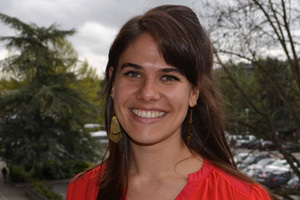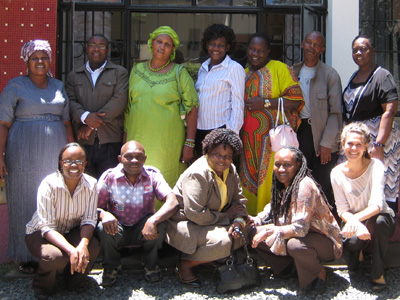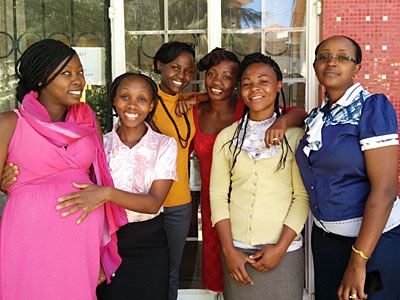PhD candidate and newly named Magnuson Scholar Anjuli Wagner is working to improve ways to find HIV-positive children in Kenya who slip through the cracks.
The fifth-year epidemiology student at the University of Washington School of Public Health conducts research for a study appropriately called CATCH – Counseling and Testing for Children at Home.

"The ultimate goal of the CATCH project is to figure out ways of identifying older HIV-infected children who missed diagnosis as babies before they become so sick with HIV that they can't respond to medicines," says Wagner (MPH, Epidemiology '12) . It's part of a larger collaboration between the UW and the University of Nairobi known as the Kenya Research and Training Center.
For her excellent academic performance and outstanding potential as a researcher, Wagner has been named a Magnuson Scholar for 2015-16. The awards, announced April 6, honor one student annually from each of the UW Health Sciences schools in memory of Senator Warren G. Magnuson and his health-care legacy. Each scholar receives $30,000 to support his or her studies.
"I'm so, so deeply honored and humbled and appreciative," says Wagner, a native of Boston. "The whole study team deserves this award."
In Kenya, Wagner says, an estimated 59 percent of children who are living with HIV remain undiagnosed. "Half of kids with untreated HIV will die by age two, and 80 percent of them will die by age five," Wagner says. "So it's really important to find them before they get sick."
How to do that?
"We start backwards, and find adults who are already in care for their own HIV infection and ask them if they have any kids that haven't been tested for HIV," Wagner said.
Children slip through the cracks for a number of reasons, including having mothers who became infected during pregnancy after they initially tested negative for HIV. Good prevention of mother-to-child transmission systems are currently in place, Wagner added, but have become widely available only recently. Even in those programs, the preventive medicine isn't always 100 percent effective.
The CATCH team has been able to talk with more than 22,000 HIV-infected adults and has offered testing to hundreds of families, Wagner said. Testing is offered at clinics or at home. HIV-positive children are then linked to treatment programs.

The study began as a pilot at the Kenyatta National Hospital in Nairobi with funding from the UW Royalty Research Fund. With additional grant money from the National Institutes of Health, it has been expanded to three neighborhood clinics in Nairobi and to one district hospital in western Kenya.
"Anjuli has made it her personal mission to find all of these 'missing children' in Kenya, and to get them into the treatment programs they need," said Jennifer Slyker, assistant professor of global health and one of Wagner's mentors. "Already this research is changing practice in our HIV clinics, and I'm excited to see these programs grow to serve even more children."
Slyker cited Wagner's exceptional compassion, creativity and leadership. "Her analytical strengths dovetail with her personal commitment to help her complete projects with real potential to impact public health in Africa," Slyker said.
Wagner had an early passion for global health and travel. "I started traveling when I was pretty young," she says. "That was my kind of rebellion." Her list includes Costa Rica, Brazil, Colombia, Mexico, Nicaragua, Panama, Ghana, Kenya, Dominican Republica and India, where her father and maternal grandfather were born.
Before pursuing graduate studies, she spent two summers working on a parasite prevention project in Ghana and another summer on a water quality monitoring project in India.

She was drawn to public health and HIV studies while taking an epidemiology class as an undergraduate at Tufts University. She chose the UW largely because of Grace John-Stewart, a professor of Epidemiology and Global Health, and director of the UW's Global Center for Women, Adolescents and Children (Global WACh).
John-Stewart, an expert researcher in HIV transmission from mothers to children and in pediatric HIV, is now Wagner's senior mentor, and Wagner spends three to four months a year in Kenya.
After earning her PhD, Wagner hopes to continue working with the Kenya Pediatric Studies group and focus on implementation science. "That's where my real passion lies," she says. "Using the scientific method to answer questions such as, 'How do we scale up something we know works in a controlled environment on a wider scale in the real word? How do we make our approach more efficient?'"
